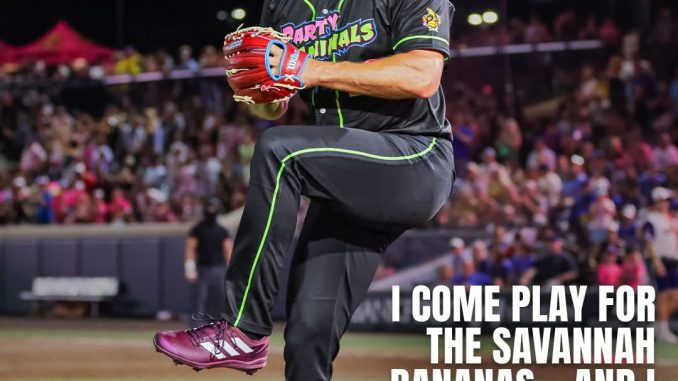
When Jonathan Papelbon talks baseball, people tend to listen. The former Boston Red Sox closer, who locked down the final out of the 2007 World Series and built a reputation as one of the fiercest competitors in the game, has always carried an unapologetically bold personality. This week, he turned his outspoken attention to an unlikely source: Banana Ball, the headline-grabbing phenomenon created by the Savannah Bananas.
In an interview that lit up social media, Papelbon praised the unorthodox version of baseball as not only fun but also potentially essential to the sport’s future.
“I’ll tell you right now, Banana Ball is the best thing to happen to baseball in a long time,” Papelbon said. “It’s fast, it’s electric, it keeps fans engaged, and honestly, it’s what Major League Baseball should be paying attention to. The Bananas are onto something.”
A Game Changer
For those unfamiliar, Banana Ball is a reimagined form of baseball designed for entertainment as much as competition. Created by Jesse Cole and his Savannah Bananas team, the game throws out tradition in favor of spectacle and pace. The rules include a two-hour time limit, no bunting, no mound visits, batters being called out if fans catch a foul ball, and walk-offs decided by sprint-style base races.
What started as a quirky exhibition in Savannah, Georgia, has grown into a national sensation. The Bananas now tour across the country, selling out major league parks and attracting viral attention on TikTok, Instagram, and ESPN.
Papelbon, never shy about calling out Major League Baseball for what he sees as its lack of excitement, sees Banana Ball as a wake-up call.
“I’ve been saying for years the game’s too slow,” he noted. “Kids today don’t want to sit through four hours of pitchers walking around the mound. Banana Ball trims the fat and delivers action. It’s genius.”
Respect From a Champion
Papelbon’s endorsement carries weight. Over a 12-year MLB career with the Red Sox, Phillies, and Nationals, he tallied 368 saves, earning six All-Star selections. Known for his fiery demeanor, Papelbon was both feared by hitters and beloved by Boston fans. If a player like him—whose career was built on the intensity of traditional baseball—can embrace Banana Ball, it underscores just how impactful the concept has become.
In fact, Papelbon admitted that if Banana Ball had been around during his career, he might have wanted to suit up.
“Man, I’d have loved to come out of the bullpen in a Banana Ball game,” he laughed. “Music blasting, fans dancing, no downtime. That’s my kind of baseball. I thrive on energy, and these guys feed off it.”
Fans and Players Agree
Papelbon isn’t the only one seeing potential. Players who’ve crossed paths with the Bananas often rave about the atmosphere. Former big leaguers like Jake Peavy and Bill Lee have even joined in on games, blending legitimate talent with showmanship. The result has been a bridge between baseball tradition and modern entertainment culture.
For younger audiences, Banana Ball may be exactly what the sport needs. At a time when MLB struggles with pace-of-play issues and waning youth viewership, the Bananas have proven that baseball—when reimagined—can go viral. Games regularly feature choreographed dance breaks, trick plays, and crowd interaction that blur the line between sport and theater.
“It’s not just a gimmick,” Papelbon emphasized. “These guys can play. But they’ve cracked the code on how to make baseball fun again. That’s what people need to see.”
MLB Watching Closely
Interestingly, Major League Baseball executives have already taken notice. Commissioner Rob Manfred has implemented pitch clocks, larger bases, and restrictions on defensive shifts—all aimed at increasing action and shortening games. While MLB hasn’t embraced anything as radical as Banana Ball, the influence is clear.
Papelbon believes the league should go further.
“MLB doesn’t have to become Banana Ball, but it can learn from it,” he said. “The fan experience matters. When you see 40,000 people screaming in unison at a Banana Ball game, you realize this is about connection. Baseball’s gotta get back to that.”
The Future of the Game?
Whether Banana Ball is the future of professional baseball or remains a wildly popular sideshow is still up for debate. But Papelbon’s words echo a growing sentiment that the sport must evolve to remain relevant.
For the Bananas, having a World Series champion and Boston legend in their corner only adds to their credibility. Jesse Cole, the team’s owner known for his trademark yellow tuxedo, welcomed the praise with enthusiasm.
“Jonathan Papelbon embodies the passion and energy we love about baseball,” Cole said in response. “For him to recognize what we’re doing means the world. Our mission is simple: make baseball fun. And it’s working.”
As for Papelbon, his stance is unwavering: Banana Ball isn’t just a novelty—it’s a revolution.
“Baseball purists can hate all they want,” he concluded. “But the Bananas are proving something important. The game’s gotta evolve. And if you don’t think this is the future, you’re not paying attention.”
Word count: ~707
Would you like me to write this more like a Boston Globe-style feature (serious tone, legacy angle) or a Bleacher Report-style sports blog (edgy, fun, viral-focused)?
Leave a Reply